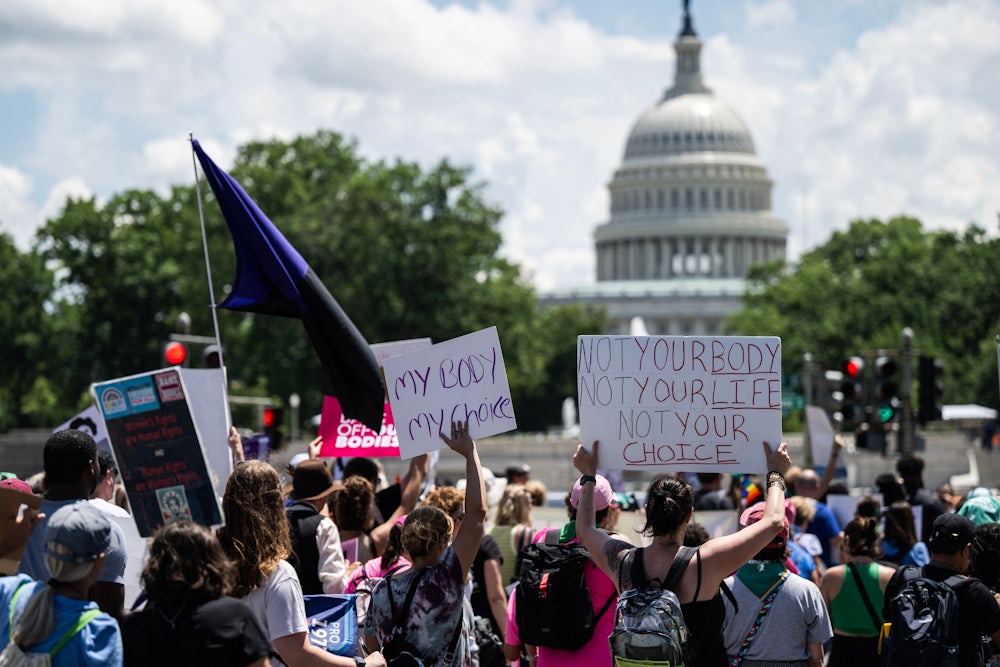For decades, the terms “pro-life” and “pro-choice” have defined the struggle over abortion rights. Although simplistic, they are common shorthand for the values of the movements to restrict or expand access to abortion. But the Supreme Court decision overturning Roe v. Wade last year catalyzed a shift in how politicians and advocates talk about abortion rights, with many no longer considering those terms sufficient to capture their principles.
Highlighting this trend, the organization formerly known as NARAL Pro-Choice America announced that it would rename itself Reproductive Freedom for All on Wednesday. “We discovered that people intrinsically think of abortion as an issue of personal freedom,” said Angela Vasquez-Giroux, the organization’s vice president of communications and research, about the decision to change its name.
Meanwhile, Republican politicians are also struggling with the language of the movement that has long identified as “pro-life.” Polling by One Nation, a nonprofit aligned with Senate Minority Leader Mitch McConnell, found that voters broadly support restrictions on abortion after 12 to 15 weeks but associate the phrase “pro-life” with a flat ban on all abortion. Earlier this month, the head of One Nation presented this research at a meeting of GOP senators.
Former President Donald Trump—who appointed three conservative justices to the Supreme Court during his time in office, ensuring the fall of Roe—has also attempted to tack to a more moderate abortion position, criticizing Florida’s six-week abortion ban and openly worrying about how emphasizing restricting abortion access could hurt Republican electoral prospects.
As both sides reckon with their mission’s future, the language that they use to identify their purpose is instructive and could provide a blueprint for politicians struggling to define their own positions.
“Choice,” “freedom,” and “justice”
The term “pro-choice” has not fallen out of favor with voters; rather, many abortion rights advocates believe it insufficiently expansive to describe the movement’s evolved goals. Vasquez-Giroux explained how her organization sees the distinction between “freedom” and “choice:” It’s impossible to make a choice about obtaining an abortion when one lives in a state where access to the procedure is severely restricted.
“For decades, even under Roe, people may have had the right to access abortion care on paper, but they didn’t have it in reality,” Vasquez-Giroux said in an interview. “For us, it’s understanding that you don’t have a choice if you can’t exercise it.”
By “centering the most impacted people,” Reproductive Freedom for All hopes to “give them a political home where they can make the impact and make the change that they want,” Vasquez-Giroux said. She described the name change not as a shift in priorities but as a way to more accurately explain their mission.
“Reproductive freedom” is not the only term advocates promote: Many prefer to emphasize “reproductive justice,” which Black women supporting expanding abortion access created in 1994, and which includes the right to end a pregnancy; the right to carry out a wanted pregnancy; and the right to raise a child in a safe, healthy, and just society. In the blog post announcing NARAL Pro-Choice America’s language change, the organization acknowledged “our partners in the reproductive justice movement” for pointing out the choice-based language’s flaws.
The term “reproductive freedom” has been used for decades, said Mary Ziegler, a University of California, Davis law professor who has written multiple books on the history of abortion access. The phrase could be a useful framework for red state politicians who support abortion rights and for campaigns to approve ballot initiatives protecting abortion access, she said. Gallup polling shows that 34 percent of Americans believe abortion should be legal under any circumstances, compared to 51 percent who believe it should be legal only under certain circumstances—and abortion rights supporters see that slim majority as persuadable voters.
“You can make reproductive freedom compatible with the idea of reproductive justice,” said Ziegler. “It can sound a whole lot like ‘choice’ to the uninitiated … but it can also sound like it’s part of the reproductive justice agenda for those who need to hear that.”
The definitional gaps between terms like “pro-choice,” “reproductive freedom,” and “reproductive justice” illustrate how audiences can perceive different messages depending on their perspective—the language around abortion can obscure as much as it illuminates. Democratic Senator Elizabeth Warren told me that she believes the words are less important than clarity of position among abortion rights supporters, which is that abortion is necessary health care. “I’m open minded about people using whatever terms they want, so long as we’re clear that ultimately, we’re talking about a full range of health care services that are available to every person that wants it,” Warren said.
Concerns about “pro-life”
Although the terms “pro-life” and “pro-choice” are static, their meanings have evolved for average Americans. With few exceptions, more Americans have identified as “pro-choice” than “pro-life” since 1995, according to annual polling by Gallup. Ziegler noted that the number of Americans identifying as “pro-life” surged during the early and mid-2010s, when Republican politicians frequently raised concerns about so-called “partial-birth abortions.” However, while “pro-life” became more popular, the number of people supporting abortion rights did not actually change significantly, she said.
In recent years, the affiliation with the term “pro-life” has declined. In May 2022, the month before the Supreme Court overturned Roe, 55 percent of Americans identified as “pro-choice”—a near-record high. Although that number slipped to 52 percent in May 2023, the change still shows that voters see “pro-life” and “pro-choice” differently than they did just a few years ago.
Ironically, the term “pro-life” was long “viewed by supporters as one of those ultimate P.R. coups,” said Ziegler—after all, no politician wants to say they’re against life. “The fact that Republicans are moving away from that is not because there’s anything inherently wrong, from a rhetorical strategy standpoint, in saying you’re ‘pro-life,’” Ziegler explained. “But it’s become so seemingly politically costly that Republicans don’t want anything to do with [it].”
Republican Senator Kevin Cramer told me that it was important for abortion-restriction supporters to have “clarity of communication.” Pro-life “has come to mean something extreme to a lot of people,” he said. “Just like ‘pro-choice’ has come to mean ‘pro-abortion,’ ‘pro-life’ has come to mean ‘no exceptions.’ ... I probably come from a place where being pro-life is probably the easiest way to say it, but not everybody does, and I understand that. We certainly don’t want to confuse people and appear uncompassionate.”
Representative Nancy Mace, a Republican who has criticized her party on abortion, told me that it was important to both use language and implement policy that was “pro-woman and pro-life.” “We can’t be assholes to women, and that’s what we have been,” Mace said. “Many of the positions and statements we’ve made are hurting us across the country. And I know that our message of compassion and caring can resonate with people, with women and with voters, if we just have the will to do it.”
Although the abortion rights movement is often conflated with the Democratic Party, and abortion opponents are considered synonymous with Republicans, the reality is not so neat. For decades, it has been enough for Republican candidates to simply say they support conservative justices and the overturning of Roe v. Wade. With the federal right to an abortion in place, any other stance was moot: It didn’t matter as much if a politician supported, say, a six-week ban instead of a 12-week ban on the procedure, because neither would stand up in federal court. But in the wake of the Supreme Court’s decision in Dobbs v. Jackson Women’s Health Organization, Republican candidates must stake out a more specific stance on abortion access—and carefully choose language that will mollify their conservative base without repelling moderate Republicans and independents.
“The Dobbs decision created a new political situation for the Republican Party, in which Republican politicians had to think more seriously about their positions on abortion—and how they want to market those positions—than they did before,” said Daniel K. Williams, a historian who has written books about the Christian right and the anti-abortion movement pre-Roe.
The “pro-life” mission
However, members of the anti-abortion movement may not be so eager to discard “pro-life.” It is not simply a party platform but a philosophy. Indeed, one of the most powerful political organizations supporting abortion-restriction candidates, Susan B. Anthony Pro-Life America, has been increasingly tetchy about Republicans shying away from a federal abortion ban. In April, the group condemned Trump for saying that the Supreme Court had returned the issue of abortion to states, and said that it would oppose any candidate who did not support a 15-week ban on the procedure. (Trump has still not endorsed such a federal law.)
In another indication of its commitment to the “pro-life” terminology, the organization roasted NARAL Pro-Choice America’s decision to rebrand. “NARAL’s decision to abandon their ‘pro-choice’ label is just another example of the radical abortion lobby lifting the curtain to show Americans their true agenda,” said E.V. Osment, SBA Pro-Life America’s vice president of communications, in a statement on Thursday.
In a statement to The New Republic, another spokesperson for SBA Pro-Life America added: “The pro-life movement embraces the label of ‘pro-life,’ unlike the pro-abortion side that runs from its former label of ‘pro-choice,’ turning from ‘safe, legal, rare’ abortions to an ‘abortion on demand for any reason’ platform.”
Some GOP lawmakers believe that “pro-life” need not be framed as an extreme position. Public opinion on abortion is indeed nuanced: An April NPR/PBS NewsHour/Marist poll found that 66 percent of Americans believe that abortion should, at most, be legal in the first three months of a pregnancy, and a July AP/NORC poll found that 51 percent of Americans think abortion should be legal through the first 15 weeks of pregnancy—in both polls, support for abortion decreased as pregnancy progresses.
Republican Senator Thom Tillis identifies as a “pro-life conservative” but noted to me that he supports “reasonable exceptions” for rape, incest, and the health of the mother. “I feel like we should feel comfortable with it, we should communicate it this way, and we should go in with the confidence of knowing 60 to 70 percent support that policy when they understand what the alternative is,” Tillis said. He also argued that it was a “winning issue,” noting that he defeated a Democratic incumbent in the 2014 Senate race after shepherding a “pro-life bill” through the legislature as state House speaker.
Policy still rules
Politicians may begin throwing alternative terms at the wall and seeing what sticks. At the conference meeting where One Nation shared polling with senators, GOP Senator Todd Young suggested using the phrase “pro-baby” to describe the Republican position. Williams, the historian, was skeptical of such efforts, however. “Any perceived change in terminology on the pro-life side is not likely to have the staying power of changes in terminology on the abortion rights side,” he predicted. The terms “pro-life” and “right to life” have been embedded in the very structure of the movement for more than 50 years and speak to its supporters’ fundamental values.
“‘Reproductive justice’ and ‘reproductive freedom’ may end up having some real appeal and real staying power, but a term like ‘pro-baby’ is unlikely to be something that we’re talking about in a few years,” Williams continued.
For her part, Vasquez-Giroux was just as critical of the idea that Republicans could shift away from “pro-life” as SBA Pro-Life America was about NARAL’S rebrand. Although some Republican politicians do not believe the term should necessarily signify support for banning all abortion, she believes that is still their core mission—and what most Americans will continue to identify as the definition of “pro-life.”
“I hope they spend all their money doing this, right? But it’s not going to be effective so long as the truth remains, and the policy remains, that their goal is to ban abortion,” Vasquez-Giroux said. “That’s what people don’t want, and that’s what they’re hell-bent on, and when those two things come into conflict, voters will win every time.”










